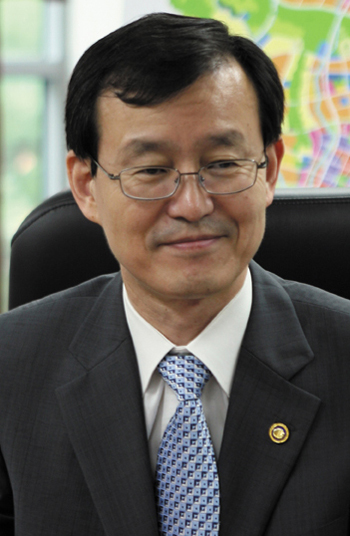Sejong City Back on Track
Construction of new administrative city is in full swing to build various buildings for 12 government ministries to relocate by 2014
 The construction of Sejong City in South Chungcheong Province, is in full swing again as the proposed plan to nullify the relocation plan decided by the previous administration to move part of the government ministries and agencies to the new administrative centered multiple city met disapproval at the National Assembly.
The construction of Sejong City in South Chungcheong Province, is in full swing again as the proposed plan to nullify the relocation plan decided by the previous administration to move part of the government ministries and agencies to the new administrative centered multiple city met disapproval at the National Assembly.
The Multifunctional Administrative City Construction Agency led by Commissioner Han Man-hee is moving rapidly to see that the construction work for the new city including various buildings where 12 government ministries, most important of all, the Prime Minister¡¯s Office are completed on time as scheduled for them to move in 2012.
The agency with 149 staff is responsible for an overall supervision and control of the construction of various buildings and other facilities in the new administrative town including design and securing the approvals from the appropriate authorities and support for various activities in the vicinities of the new town. The agency with two bureaus, a hall, 15 sections, in its organization, also is responsible for securing budget allocations for the new city. It also has the authority to issue various permits for residential houses, apartments and educational facilities from primary, middle and high schools.
According to the Sejong City Construction Plan, the new town is designed to have 500,000 residents by 2030 with six major functions. In the first stage, it will be an administrative and an international culture, with 150,000 residents by 2015. In the second stage, the city will have research facilities and universities, medical and welfare facilities and industries by 2020 with the number of residents rising to 300,000. In the third stage, the city will have expanded residential areas and complete basic facilities with the number of residents expanding to 500,000 by 2030, all according to the plan by the agency.
The agency projected a total investment of 22.5 trillion won to complete the city with 8.5 trillion won footed by the central government and 14 trillion won by the Korea Land and Housing Corp. and as of Sept. 31, 6.37 trillion won has been spent, or 28.3 percent of the total investment. Besides, the central government will allocate 1.07 trillion won for the construction of infrastructure in and around the city such as roads and public facilities. Korea Land and Housing Corp. spent 5.3 trillion won or 37.9 percent of its total investment, so far to pay for land and the construction of basic infrastructure.
The government fund includes 3.15 trillion won for various transportation facilities in the town, 1.6 trillion won for buildings and other facilities for central government ministries and agencies to move in and 3.75 trillion won for schools and the municipal administrative building. LH will spend 5.01 trillion won to pay for land and 8.99 trillion won for welfare and basic facilities for the new town.
According to the relocation schedule of the government ministries and agencies including the Ministry of Strategy and Finance and the Ministry of Land, Transport and Maritime Affairs, in 2012, the Prime Minister¡¯s Office will move to the new city, along with such ministries as the Ministry of Strategy and Finance, the Fair Trade Commission, the Ministry of Land, Transport and Maritime Affairs, the Ministry of Environment and the Ministry of Agriculture, Fishery and Food, altogether six ministries.
By 2013, six government ministries and organizations will move to the new city including the Ministries of Education, Science and Technology, Culture, Sports and Tourism, Knowledge Economy, Health and Welfare, Labor and Employment, and the Patriots and Veterans Affairs. In 2014, six government agencies will relocate to the new city such as the National Tax Service, the Anti-Corruption and Civil Rights Commission and the Ministry of Government Legislation, among others.
In addition, 16 government-funded organizations such as the Korea Development Institute and Korea Land Institute will move to Sejong City by 2012 with 3,353 employees. The Ministry of Public Administration and Security will take charge of taking all kinds of measures for early settlement and comforts of government employees and those working for government-funded organizations who moved to the new city have comfort and convenience in their work places as well as at home. The ministry will set up policies for residential comfort, welfare programs, and support for their lives, among others. nw
Commissioner Han Man-hee of the Multifunctional Administrative City Construction Agency in charge of building government offices and public facilities in Sejong City.
3Fl, 292-47, Shindang 6-dong, Chung-gu, Seoul, Korea 100-456
Tel : 82-2-2235-6114 / Fax : 82-2-2235-0799